
Pipeline: FDA approves new drug for optic neuritis, NMOSD
Fast track and orphan drug designation granted.
The U.S. Food and Drug Administration (FDA) recent approval of Enspryng (satralizumab-mwge, Genentech) makes it the third approved drug for the treatment of neuromyelitis optica spectrum disorder (NMOSD) on the market.
NMOSD is a rare autoimmune disease that affects adults who are anti-aquaporin-4 or AQP4 antibody-positive. Optic neuritis, eye pain, and vision loss occur in individuals with NMOSD whose immune system mistakenly attacks healthy optic nerve cells. The disease is estimated to affect 4,000 to 8,000 Americans.
Enspryng was demonstrated to be effective in the treatment of NMOSD in two 96-week clinical studies, according to the company.
The study’s first trial group included 95 adult patients; 64 of whom had antibodies against AQP4 (anti-AQP4 positive). Enspryng reduced the number of NMOSD relapses by 74 percent during this study, compared to treatment with a placebo.
The study’s second trial group included 76 adult patients; 52 of whom were anti-AQP4 positive. Enspryng reduced the number of relapses in anti-AQP4 positive patients by 78 percent during this study.
Enspryng’s prescribing information includes a warning for increased infection risk, including serious and potentially fatal infections—such as potential reactivation of hepatitis B and tuberculosis. Additional warnings include elevated liver enzymes, decreased neutrophil counts, and hypersensitivity reactions.
Common side effects observed include the common cold (nasopharyngitis), headache, upper respiratory tract infection, inflammation of the lining of the stomach, rash, joint pain, extremity pain, fatigue, and nausea.
Vaccination with live-attenuated or live vaccines is not recommended during treatment with Enspryng and should be administered at least 4 weeks before treatment begins.
Enspryng demonstrated the potential to address an unmet medical need for a serious condition. It’s development and review will be expedited because it received fast track designation from the FDA. It also received orphan drug designation.
Newsletter
Want more insights like this? Subscribe to Optometry Times and get clinical pearls and practice tips delivered straight to your inbox.





























